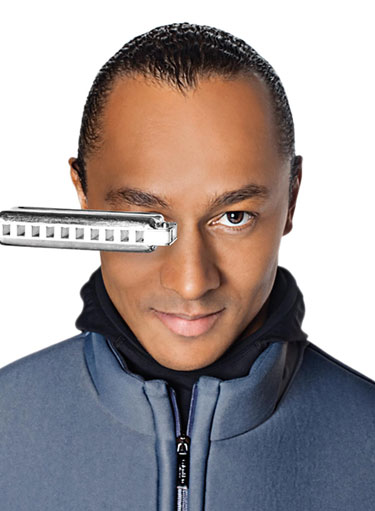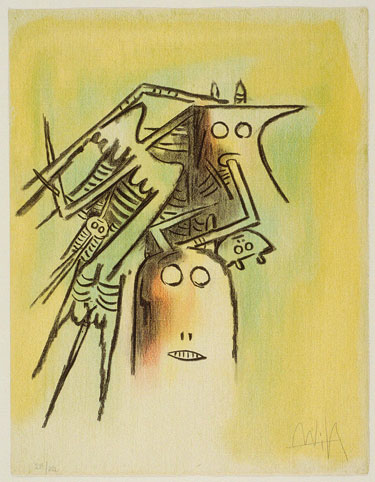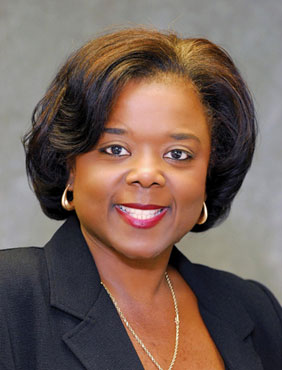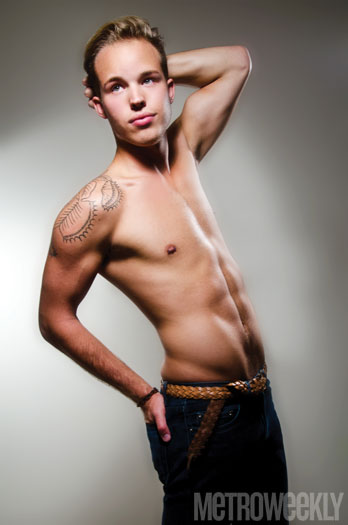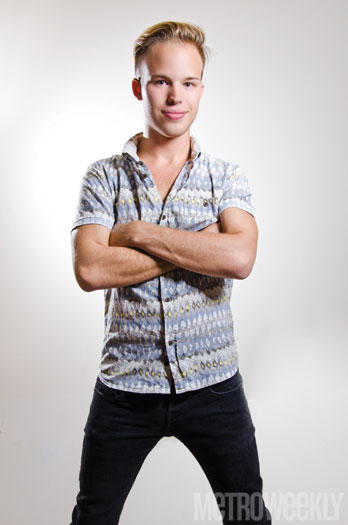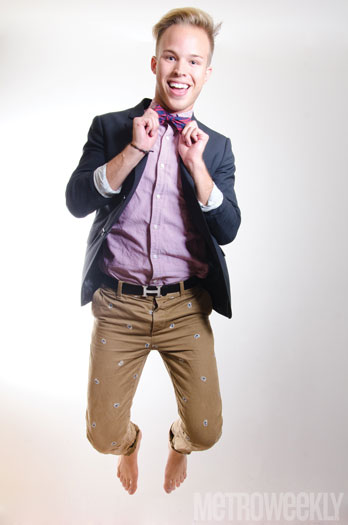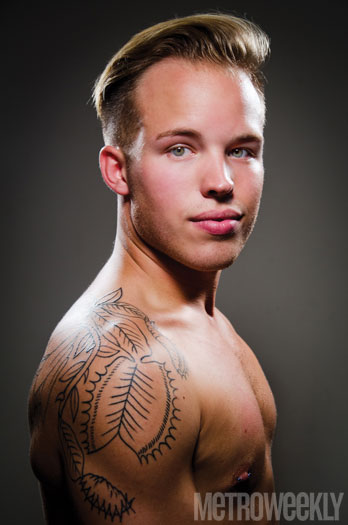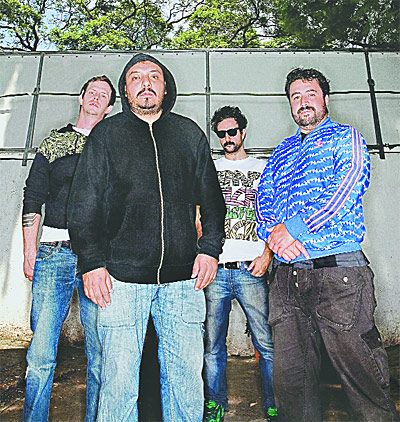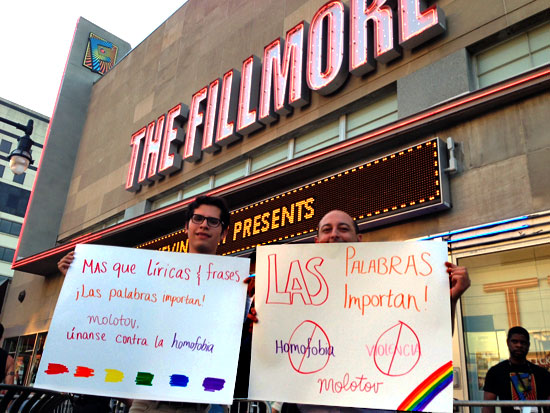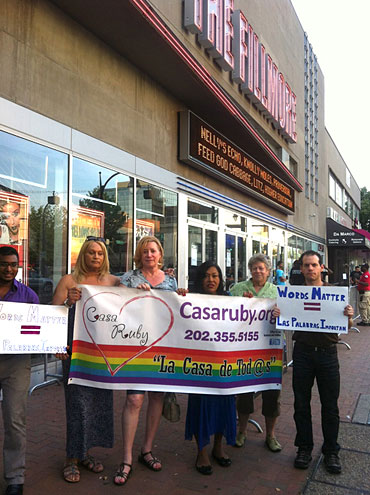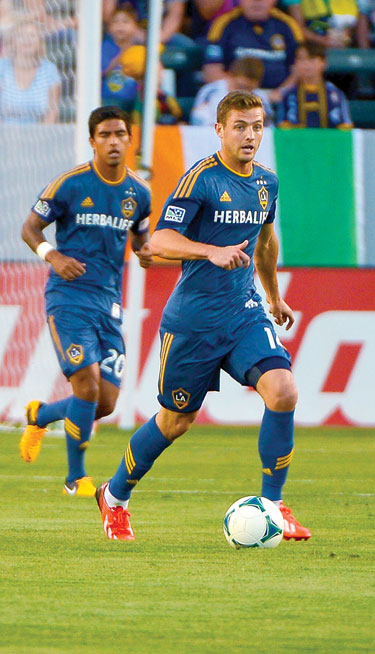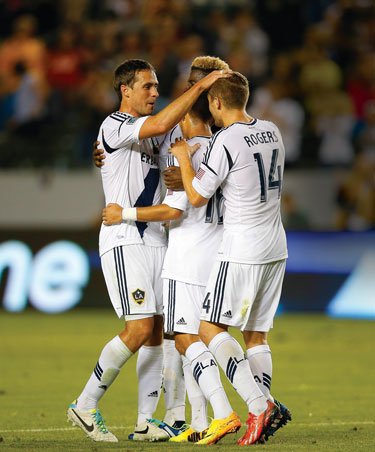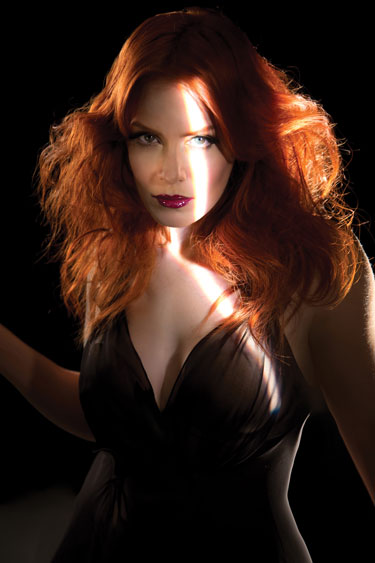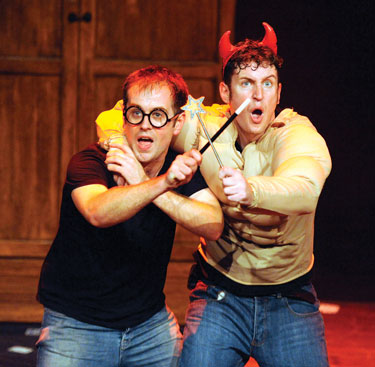Feature Story:
Recently, Ana Matronic left a voicemail. But it wasn't for Pickles, so she didn't ham it up. And since she was calling for a Metro Weekly interview, she also didn't exactly propose a "kiki." But in her way she did complain about the MTA.
"I am a little bit late, my apologies," Matronic said. "I was running errands, and at the mercy of the subway."
![Ana Matronic]()
Ana Matronic
(Photo by Seth Kirby)
Last year at this time practically every gay in the global village was complaining about the MTA -- "which should stand for Motherfuckers Touching my Ass," as Matronic so memorably put it on "Let's Have a Kiki," the Scissor Sisters hit.
Then, just a couple months later, when people were still drunkenly "kiki"-ing, or partying, the band announced it was going on an "indefinite hiatus" to allow the foursome to take a vacation and pursue other projects. The hiatus is still very much on. Matronic, for one, is nearing the final stage of putting together a debut solo album, with the first single expected by Halloween and the full set due "shortly after that." As a teaser, and an excuse to get back onstage, Matronic will preview at least one song from the new set at Town Danceboutique on Saturday, Sept. 7.
"I think it's just gong to be a short little set," Matronic says, "but we're going to be as in-your-face and hopefully as fun as possible." She's bringing with her Benny and Javier Ninja, from Harlem's "Legendary House of Ninja," made famous from the classic 1990 documentary Paris Is Burning and known for elaborate drag balls and voguing. "I've been under their incredible tutelage. They are my sensei," Matronic says. "I've been learning to vogue and we've been working on a live show together."
Matronic will perform at least one Scissor Sisters song -- as well as "Let's Have a Kiki," of course -- on which she was prominently featured. From "Tits on the Radio" to "Kiss You Off" to "Any Which Way," any time Matronic was out front in a Scissor Sisters song, it was a party.
In fact, the more you learn about the band, the more you appreciate that Matronic, in many key respects, has been the driving force behind the Scissor Sisters. Especially in concert, Jake Shears may be the lead singer and lead showman, but Matronic was essentially in charge of the stage goings-on, particularly for last year's tour. More fundamentally, Matronic, the lone female and heterosexual, was also instrumental in making the band. She put its pseudonymous founders, Shears and Babydaddy, onstage for the first time as Scissor Sisters in 2001 at the New York club party she promoted, joining them to add some pizzazz. The two gay men smartly realized they needed her to be in the band. With her charisma and stage know-how, she helped the band generate buzz for its music, turning it into one of the world's biggest pop acts -- certainly the gayest.
Even on the phone, Matronic oozes charisma. She also proves herself to be smart and savvy -- and sweet -- and one of the gay community's staunchest straight allies, using her pop-star platform to draw attention to gay rights, particularly internationally. To paraphrase a famous line of hers, Putin: She's gonna let you have it.
METRO WEEKLY: Let's start with the question on everyone's mind: "Indefinite hiatus," is that still the status of the Scissor Sisters?
ANA MATRONIC: As far as I know, yeah. But I don't think it's going to be too long. I definitely know how I feel as a performer. I am always itching to perform, and I'm sure it's not too long until we're like, "Okay, it's been a while. We're getting bored here. Let's get back together. Let's do this." But it has been nice having a bit of a break in getting off the roller coaster, because it can be really hard and very, very demanding. We did two albums back to back. Writing, recording, touring. We never really stopped touring between Night Work and Magic Hour. We probably only really had about three months off between the touring of the two, so it was a real ride. The hiatus has been nice. I've definitely been able to get some shit done that was ignored or put off.
MW: Well, you hear "indefinite hiatus" and automatically assume the band's never going to get back together. They're done. But you're saying you don't see things that way with the Scissor Sisters?
MATRONIC: No, I definitely don't. I definitely know that we have at least one more album and tour in us, if not more. We all have other pursuits and other projects that we've worked on since the beginning of the band, and so it's nice to just take a step away, be able to do those other things. And I think you come back together feeling very individually fulfilled. Because sometimes when you are in a group, that group takes over, and you are locked into a dynamic. Locked into a role. And there are so many other modes of creativity for each of us in the band, so it's been really fun for me to have some time to concentrate on writing my comic book, which I've been writing for three years. And work on the Joshua Light Show. And work on a solo record. And collaborate with people that I've been talking about collaborating with for years and never really had the time because I was on tour with Scissors. It's been nice to be able to do those things, but I definitely know that there is something with Scissor Sisters that doesn't happen anywhere else. There is a magic in the combination of the four of us that I don't think I'll be able to create any other place. And certainly not alone.
MW: Would you mind briefly explaining how you got started with the Scissor Sisters? I've seen a couple slightly conflicting stories. Where did you meet Jake and Babydaddy?
MATRONIC: Jake and I met through mutual friends on Halloween at the Slipper Room, this club in the Lower East Side where I was doing a show. We met on Halloween. He was dressed as a late-term back alley abortion, and I was dressed as an Andy Warhol Factory reject. And we took one look at each other, and I was like, "You're my kind of freak." And I invited him to perform at our next cabaret show, which was a week later. And he was there onstage and performed a couple times. And then he brought Babydaddy, and they performed as Scissor Sisters. So the very first show was at my night at the Slipper Room, called "Knock Off." I introduced Jake and Babydaddy as Scissor Sisters. They performed twice at the cabaret. And then at a friend's birthday party, about a month after that, Jake said, "Oh, you know, we've been thinking we might want some feminine energy in the band, and I can't think of anybody who'd be more amazing than you."
MW: Did you have any qualms about joining a band with that name?
MATRONIC: No, oh my God, not at all! I was really mad I didn't think of it myself. Luckily, I got to have at least some ownership of it.
MW: Did the idea for "Let's Have a Kiki" germinate with you?
MATRONIC: It was a collaboration. "Let's Have a Kiki" was Jake's idea, and it was also his idea to do the phone message. But everything in the phone message was me, sort of basing it on a former experience and trying to come up with something funny and engaging. And something to start a party. And wow! Did it ever! More than I could have ever imagined. I knew it was a fun song, but I had no idea the phenomenon it was going to create.
MW: Well, maybe you can do it again with a future single from your debut album.
MATRONIC: I do hope to be delivering an entire album of that fun. [The solo set] is definitely a record that is designed for the dance floor. That's where I find my bliss, and that's where I want to create it as well.
MW: I know that a solo record is just one of several Scissor Sisters side projects you're working on during the hiatus. Another is lighting design. I understand you're working with your husband, Seth Kirby, on that.
MATRONIC: Well, he does a multitude of things, and he's actually my main collaborator on the music for the solo record. Both Seth and I are in a light show called The Joshua Light Show. It was the original psychedelic light show in the '60s at the Fillmore East. And about eight years ago they had a revival of the light show, and Seth has been a part of it since the revival and has become the sort of right-hand man to Josh, the originator of the light show. And I joined in 2010. All the stuff that I do is with liquids. I use a giant overhead projector, and make light that plays behind bands out of oil and water, and the combination therein. All that old liquid imagery that you see from the '60s behind Jefferson Airplane or Jimi Hendrix or the Grateful Dead, I know how to do!
MW: How often does the Joshua Light Show tour?
MATRONIC: We do gigs all over, pretty much anytime we're asked. In April, we were at [University of California] Davis playing with Medesky Martin & Wood. We were at Pace University in end of June/July with So Percussion, and then in October we're going to London to play the Barbican [Centre] for two shows. Oh, and we're backing up MGMT when they play the Barclays Center in Brooklyn in December. I'm super excited about that, I love them.
The Light Show is such an amazing thing to see. It defies description. It's a lot like talking about music. It is its own beautiful visual music that really enhances the experience. It's incredible to see and it makes what you hear have so much more depth and layers.
MW: Do you ever incorporate that into your performing, in your music?
MATRONIC: Yeah, actually. Seth and I made visuals for the last Scissor Sisters show. So there were several songs that had handmade visuals by Seth and myself. And he's done work with Scissor Sisters throughout. He did some visuals on the Night Work Tour, had some on the Ta-Dah Tour. So, yeah, he and I have had our fingers in the production of Scissor Sisters. But it's going to be very hands-on for my solo record, and has been so far. It's really just been all us. The photo shoots, the imagery -- all of it is coming from us and from our creative collaborations, and literally from the inside of our house.
MW: I guess that's something in all these years of covering Scissor Sisters I overlooked: your role with the band's live production, which was always top-notch.
MATRONIC: I was more or less the production designer on the last tour. So I was writing lighting cues and working with the lighting director on the show and overseeing the production and watching shows every night and giving back notes and things like that. So the live experience is something that is really, really important -- the most important thing, as far as I'm concerned. I'm really, really invested in what the audience gets from us. And so I was really heavily involved.
MW: Let's talk a bit about your childhood in Portland, Ore. I understand your parents separated when you were young.
MATRONIC: Yeah, very young, 3.
![Ana Matronic]()
Ana Matronic
(Photo by Seth Kirby)
MW: And the separation was a result of your father coming out as gay. Is it true that part of the reason you think you long ago immersed yourself in gay culture is because your father was gay?
MATRONIC: That sentiment is in hindsight. It was never something that, when I was 20 and attracted to drag, it wasn't because I had lost my father at 15. It was just because that's what I liked.
Looking back, I think there was a subconscious desire for me to understand my father in a way that I wasn't -- you know, I'm not able to talk to him about his experiences. But I think I really learned a lot about where his head was at, and why he made the decisions he did. And it provided me a great deal of, I think, understanding and forgiveness, because, when you're a kid and your dad leaves you, you don't really understand the reasons why. And you can hang on to that anger and never process it and never let go. And it can cause really detrimental things later on in life. And so, I think in order to forgive and to process the anger and those feelings of abandonment, I subconsciously immersed myself in a world -- or, maybe it was just moving to San Francisco, because that's where he had lived.
My father was never, to my knowledge, involved in the drag scene, or any sort of scene. He was, besides his sexuality, a pretty straight person. He was really preppy, had a Silicon Valley job. And liked musicals and interior decorating. [Laughs.] It sounds really cliché, but that's what he was into. Looking back on it in hindsight, I think there was a certain desire to understand what was going on with my father. But, really, I just sort of fell into this drag community and it spoke to me as somebody who loved to put on the glamorous look and lip-synch to songs, and to get onstage and perform. And that's what drag was and continues to be: this great way to get that hit of performance adrenaline, which I love.
MW: How was growing up in Portland?
MATRONIC: I'm so thankful I grew up there, because I definitely felt like a city kid even though it's a very manageable city, where I could walk around as a 10-year-old, unaccompanied, and feel more than safe. But Portland, it doesn't have the diversity of a big city, the kind that I crave. I felt like I had already, at 21, experienced what Portland had to offer. Portland was live music and beer, and hanging on a friend's porch, and nine months of rain.
MW: As an aside, I should ask what you think of Portlandia?
MATRONIC: Oh, my God. Okay. Portlandia is so on-the-nose, it's crazy. I think it's hilarious. I have one major gripe with Portlandia and that is it never rains on that show. Why does it never rain? And there's never been a sketch about the rain. And there has to be or I'm not going to watch it anymore. Yeah, with the women's bookstore skit, it should always be raining when people are going in there, I think. Why else are people going in there? It's raining!
MW: Your first big city was San Francisco, where you and your sister had gone often to visit your father after he moved there.
MATRONIC: Oh, yes, several times a year. So San Francisco was already a second home to me by the time I was a teenager. And moving there felt at once exciting and challenging, but also like a homecoming. I hadn't been there since my father passed away.
MW: Did you consider yourself close to your real father?
MATRONIC: I didn't think of him as a very open person, but yes, I was as close as I could be with quarterly visits, and we would talk maybe once a week. And then I have my stepfather who really was my more dominant father figure, who came into my life when I was 7. So I was very lucky to have two dads in my life. I had very strong day-to-day dad in JF. And then Robert, my biological dad, he was sort of my fun dad, and he took me to do fun things every time I would come see him. And he's the first person to take me to New York, actually.
MW: Who do you take after most?
MATRONIC: Well, I'm definitely my mother's child, but my father gave me some real gifts and some real traits. I love, love, love architecture, and that's my father all the way. And I love theater and theatrical stuff, and that's also my father. He was really into the theater, and very much into old-style Hollywood glamour, and loved taking me shopping. He was a very sensual person. He loved anything that tasted good, smelled good, looked good. So he passed on a real love of that to me. I've never felt his presence so much as I have while renovating a home, which is what my husband and I have been doing for five years. We've been renovating a house in Brooklyn. It's his voice that I hear, "Yes, go all the way. Do not half-step it."
MW: Growing up, were you performing and viewing yourself as a performer?
MATRONIC: Yes, definitely. My mother likes to say that, when my sister and I were in the bathroom, she never knew how many people were actually in there because there were so many different voices going on. And my sister and I were definitely two little hams together. We were Muppet Babies. We loved The Muppet Show. And I really credit The Muppet Show as being one of my first inspirations, because it was all about what was happening backstage, and then what was happening onstage. We were both really into performing, and both were in drama in high school. We both won Actor of the Year our senior year in high school. [Laughs.] And she still does music as well. She's in a taiko drumming group in Seattle, where she lives.
MW: I understand that your mother is a big fan of yours?
MATRONIC: She is. She wears a sparkly shirt that says "Mama Matronic" across it. She loves to come see us perform. She's 77 now, so she doesn't get to make it out to some of the shows as much as she'd like, but she's never missed a show when we go to the Northwest.
MW: One of my colleagues, who is a huge Duran Duran fan, wanted me to ask how was it working with them, recording the 2010 song "Safe (In The Heat of the Moment)" and singing with them live a few times?
MATRONIC: It was one of those things that I can't even call a dream come true, because I never even in my wildest of wild dreams thought that I would ever work with Duran Duran. So it's one of those things that's so incredible and so awe-inspiring, it kind of doesn't compute. I had to at one point early on in the process -- I was in the studio with Mark Ronson and Simon LeBon and Nick Rhodes -- and I had to walk out of the studio and walk into the bathroom, close the door and just kind of have a little mini freak-out. I looked into the mirror, and there's this 10-year-old me, wetting her pants. [Laughs.] And it's that little chubby 10-year-old that I sort of elbow in the ribs and just think, "Can you believe this? You never thought this was going to happen!"
MW: Tell me about the work you do with Amnesty International, raising awareness about global gay rights.
MATRONIC: I'm involved with Amnesty particularly in the case of a woman named Noxolo Nogwaza. She is an LGBT activist in South Africa, who was brutally beaten, raped and stabbed to death for her work. And so I've been working with Amnesty just in an effort to get her story out, but also just to get people to support Amnesty, and support gay rights, not just in America but in the world. We've come really far in America, and thank God for our Supreme Court repealing DOMA. I'm really happy about that. But stories like Noxolo really show us how far we have to go in the rest of the world. And there's still a lot of work to be done.
What we can do as people is take the time to send an email, or send a letter; send a note of support to somebody. I think about my gay friends in Russia. I think about Pussy Riot in Russia every day. And I think what we really need to do right now is just use our voices in whatever way we can. Amnesty is a really important way to do it.
It's really important for gay people to be visible. For people like Noxolo who take the chance to be visible, they can often pay with their lives. And I don't think that should be forgotten.
MW: On the topic of Russia, there's a lot of debate over what in the grand scheme of things seems trivial -- whether we should boycott Russian vodka such as Stoli, for example. How do you feel about that? What do you think people can do to make a difference?
MATRONIC: I think people do what's important to them. And I think in America we do speak with our wallets, and we speak with our money. We have a capitalist system. And so taking your dollars and using them that way I think is one. I'm not buying Russian vodka. I'm trying not to buy Russian products.
It's really difficult because my heart wants to say boycott the fuck out of Russia. But then I've been there and I've met the people who put on the Queer Fest in St. Petersburg, and I want to support them. And I don't want to not go to Russia because that would mean not seeing them, and not supporting them physically. But I think Vladimir Putin is a motherfucker. And I think he is setting himself up to be a czar. Putin is putting himself in the same place that Czar Nicolas, in the same place that Stalin was in, in the same place that Lenin was. And it's not democracy, it's bullshit. And so we have to continue to use our voices. I'm very lucky to have a platform, and my voice can reach a lot of people. I just think that it's important for everybody to do something. And I think that for me what really works, and what we need to do, is use our voices. It's hard. It's early days yet. But I'm hopeful that with enough voice and enough pressure, we can change things.
You know, I came of age in the '80s and '90s, when ACT UP was a big thing. And I had that "Silence=Death" bumper sticker on my car. And I believe it. Silence equals death. If you do not speak up your rights will be taken away. And the voice and the visibility just lends to the cause, and lets people know that the homosexual community is a community of human beings.
MW: What else is on your horizon? Is it true there are talks of you becoming a judge on the U.K. edition of The Voice?
MATRONIC: I don't know. There have been rumors. I've been a mentor on The Voice over there. And I think a couple of judges are leaving. I would love to do it. It would be so fun. And I'd get to sit in one of those chairs! It'd be rad. Beyond that, I would really love to work with people who have amazing voices but then maybe have some confidence issues, or some performance anxiety. Or need performance help, because that's something I'm really good at. I can get a good performance out of somebody.
MW: You did something similar with Eurovision, I gather.
MATRONIC: For Eurovision I just provided commentary, which was so fun. And it was just me in a booth watching the show and then introducing each act and stuff. It was so much fun, I had a great time. And I hope they ask me back. I had such a blast.
MW: How about personally? Do you see any kids in your future?
MATRONIC: Oh boy. I love the idea, but completely terrified by the reality of it. But perhaps. And if not biological, than probably adopt a kid. Sometimes I think that maybe a foster kid, or if there's a trans kid who's been in foster care, who needs a place, that may be my kid someday. I don't know. I'm open.
Ana Matronic performs Saturday, Sept. 7, at Town Danceboutique, 2009 8th NW. Cover is $8 before 11 p.m., or $12 after. Call 202-234-TOWN or visit towndc.com.
...
more
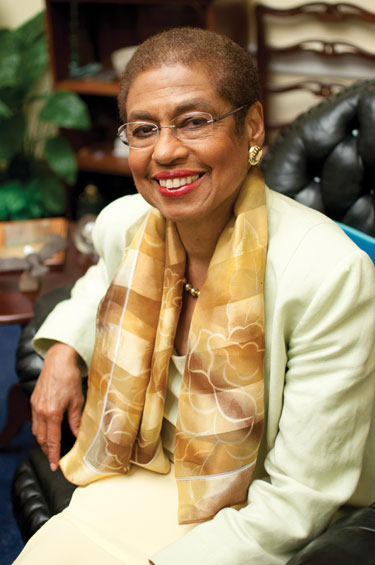
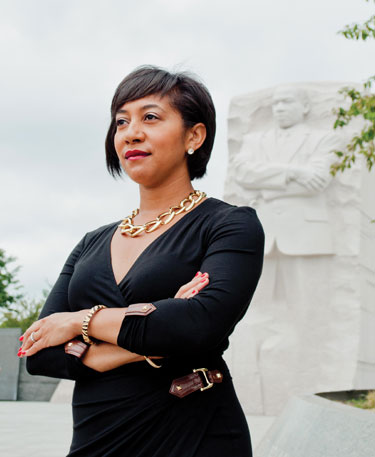
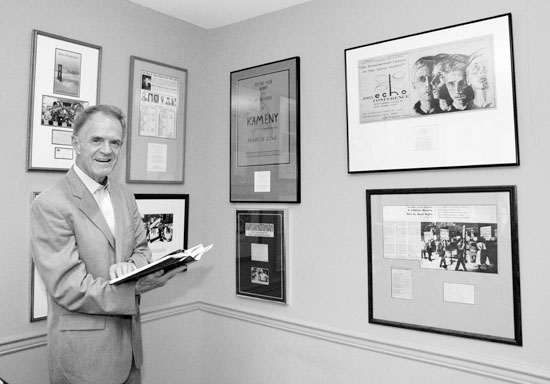

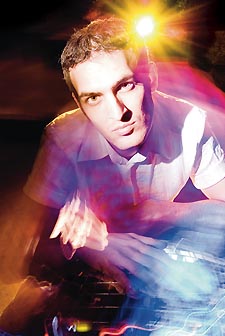 Jason Royce [file photo]
Jason Royce [file photo]
